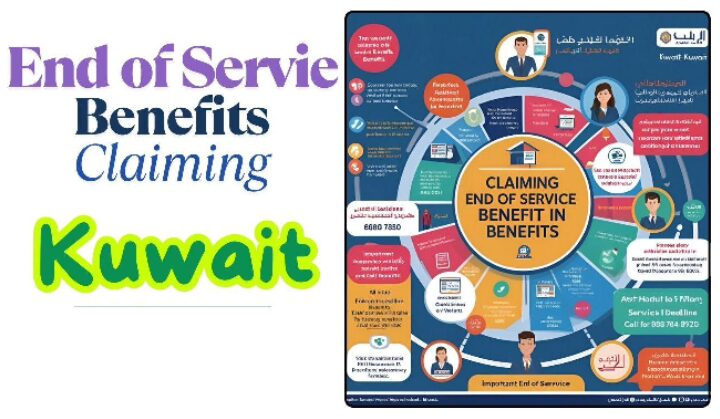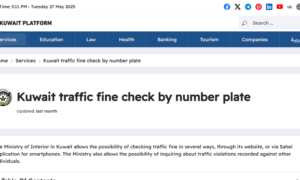For many expatriates working in Kuwait, End of Service Benefits (EOSB) represent a crucial financial security net after years of hard work. Yet, despite being a legal entitlement, many employees face challenges in understanding, calculating, or even receiving their indemnity payouts. This guide will walk you through how to claim your EOSB , explain common issues expats face, and provide direct access to trusted tools and resources to protect your rights.
Trusted Source : Information in this guide is based on verified insights from KuwaitExpat.com, a reliable portal for expatriates living and working in Kuwait.
What Exactly Are End of Service Benefits in Kuwait?
End of Service Benefits (EOSB) are payments made to employees upon the end of their employment contracts. These are regulated under Kuwait’s Private Sector Labor Law (Law No. 6 of 2010) and apply to both Kuwaitis and expatriates .
EOSB can be received if the employee:
- Resigns after completing at least 3 years of service.
- Is terminated after 1 year or more.
- Completes the contract without renewal.
These benefits are not bonuses; they are legal rights that employers must pay within seven days of your final working day.
Why Many Expats Lose Their EOSB (And How You Can Avoid That)
Despite the law, many expatriates either receive less than they’re entitled to — or nothing at all. Here’s why this happens and how to protect yourself:
1. Lack of Documentation
Many workers don’t keep copies of contracts or payslips. Always retain:
- Original job contract
- Salary transfer records
- Written communication regarding resignation or termination
2. Misunderstanding the Calculation
Employers might present incorrect amounts, assuming employees won’t verify them. Use the official indemnity calculator Kuwait to estimate your rightful compensation before signing any settlement document.
3. Fear of Legal Action
Some expats hesitate to report violations due to visa status or fear of blacklisting. You should know that the Public Authority for Manpower (PAM) provides labor dispute resolution services even if you’re no longer employed.
Step-by-Step Guide to Claiming Your EOSB
Here’s a practical process you can follow when exiting your job in Kuwait:
Step 1: Confirm Your Eligibility
Make sure you’ve completed at least one year of service. If you resigned, check how many years you’ve worked to see if you’re eligible for full or partial benefits.
Step 2: Use an Online Calculator
Before discussing your dues with HR, get an estimated amount using the trusted indemnity calculator Kuwait. Enter your last basic salary, employment duration, and departure type (resignation or termination).
Step 3: Submit Your Final Request in Writing
Once you have an estimate, formally request your final settlement and include:
- End date
- Salary details
- Bank account information for transfer
Step 4: Settle Company Dues
Clear all company obligations:
- Return ID cards, laptops, or other equipment.
- Request and collect an Experience Certificate .
Step 5: File a Complaint if Delayed
If the employer refuses or delays payment beyond 7 days:
- Visit your local Labor Relations Office under PAM.
- File a complaint using your employment documents and the EOSB estimate.
Common Calculation Breakdown
| Years of Service | Resigned? | What You’re Entitled To |
|---|---|---|
| < 3 years | Yes | Usually not eligible |
| 3–5 years | Yes | 50% of total indemnity |
| 5–10 years | Yes | 2/3 of total indemnity |
| 10+ years | Yes | Full indemnity |
| 1+ years | Terminated | Full indemnity |
The basic salary only is considered — no allowances, bonuses, or overtime.
Can You Claim EOSB After Leaving Kuwait?
Yes, but it becomes more complicated. If you’re outside Kuwait:
- Have someone represent you legally (via a signed power of attorney).
- Maintain access to your bank account in Kuwait for wire transfer.
- Use KuwaitExpat.com to track any changes in the legal claim process.
What If You’re Switching Jobs?
If you are switching employers within Kuwait , you are still entitled to EOSB from your first employer . However:
- The benefits must be settled before transferring your residency to the new sponsor.
- Ensure you have a No Objection Certificate (NOC) if required.
If you plan to drive during this transition period, remember to keep your driving documents up to date. Refer to the kuwait driving license guide to renew or update your license during this time.
EOSB and Gratuity Are Not the Same
Many confuse End of Service Benefits with gratuity or severance pay . These are different:
- Gratuity may be offered voluntarily or based on company policy.
- EOSB is a mandatory legal requirement under Kuwait Labor Law.
What If Your Employer Offers You a Lump Sum?
Sometimes employers offer a lump-sum payment, requesting that you sign a release letter. Do not sign anything unless:
- You’ve calculated your indemnity via KuwaitExpat.com.
- You’ve cross-checked figures with labor laws.
- You’re confident you’re receiving the full amount.
Signing a release waives your right to future claims, so be cautious.
Key Legal Protection Tips
- Never resign verbally — always submit a signed letter and keep a copy.
- Get everything in writing : termination notices, calculations, settlement offers.
- Keep records of your work period, especially start date and any contract renewals.
- Use Arabic-English contracts to avoid translation disputes in court.
Final Thoughts
Claiming your End of Service Benefits in Kuwait is not just about collecting money — it’s about asserting your legal rights and ensuring a fair closure to your professional journey in the country. By preparing documentation, understanding the law, and using trusted tools like the indemnity calculator Kuwait, you can confidently handle the process.
If you’re planning to stay in the country or return in the future, don’t overlook key requirements like your kuwait driving license, which often needs renewal after employment ends or visa status changes.
For continuous updates and resources, visit KuwaitExpat.com , your trusted source for navigating expatriate life in Kuwait.

































